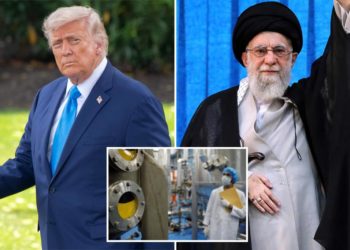Elon Musk’s bitter falling-out with President Trump could be costly for Tesla.
As long as he is persona non grata in the Trump administration, Mr. Musk, the chief executive of Tesla, will struggle to persuade Republicans not to gut climate policies worth billions of dollars to the electric car and battery company.
Mr. Musk may also lose sway over federal regulators who could make or break his plans to deploy driverless taxis, which he has described as the future of the company.
Tesla is already suffering steep declines in sales and profit. The company’s share price plummeted 14 percent on Thursday, its biggest one-day decline, after Mr. Musk and Mr. Trump began insulting each other on social media. The stock recovered somewhat Friday, rising nearly 4 percent, perhaps on hopes that the men would reach a truce or because investors thought the stock was now a bargain after the previous day’s drop.
There was always a disconnect between Mr. Musk and his Republican allies on electric cars. The domestic policy bill passed by House Republicans and being considered by the Senate will hurt the electric car market in the United States, where Tesla is the largest manufacturer by far.
The bill would eliminate tax credits of up to $7,500 for people who buy electric cars. It would quickly phase out subsidies for battery factories and lithium refineries, and end financial support for electric vehicle charging stations. The bill imposes an annual fee of $250 on electric vehicle owners that environmental groups say is punitive.
Those measures would hurt all carmakers that sell electric vehicles. But the Trump administration and Republicans in Congress are also trying to kill regulations that are especially beneficial to Tesla. Those rules allow Tesla to sell clean air credits to other carmakers that fail to meet environmental standards.
During the first three months of the year, Tesla sold regulatory credits worth $595 million, which was more than the company’s net profit of $409 million. In other words, without the credits, Tesla would have lost money.
“In many years, it’s the difference between being in the black and being in the red for Tesla,” said Jesse Jenkins, an assistant professor at Princeton University who studies the electric vehicle industry.
Mr. Jenkins has calculated that the Republican measures would result in sales of 7.7 million fewer electric vehicles by 2030 than would be the case if Biden administration policies remained in place. Tesla would sell 3.4 million fewer electric vehicles, or almost two years’ worth of sales, assuming it maintained its current U.S. market share of 44 percent of all new electric cars sold. Republican legislation would also eliminate programs that subsidize the cost of large battery storage projects, which has been a growth business for Tesla.
At least until this week, Mr. Musk appeared to accept that the Republican measures were a necessary sacrifice to avoid a soaring federal deficit, which he maintains will bankrupt the nation.
He may also have reckoned that benefits to his other businesses, like SpaceX, would more than compensate for the hit Tesla took. Or he may have assumed that the rollback of electric vehicle incentives would hurt Tesla less than they hurt companies like General Motors and Ford Motor, which are still losing money on the electric cars they sell.
On Thursday, however, Mr. Musk seemed to decide that the costs of the bill were too great to Tesla.
“Keep the EV/solar incentive cuts in the bill, even though no oil & gas subsidies are touched (very unfair!!), but ditch the MOUNTAIN of DISGUSTING PORK in the bill,” he wrote on X.
Mr. Trump, who claimed on Truth Social that Mr. Musk “went CRAZY!” over the rollbacks, threatened to cancel government contracts with and subsidies for SpaceX and other businesses Mr. Musk controls.
Mr. Musk had also expressed hope that the administration would create a more favorable climate for autonomous vehicles, crafting federal standards to replace state rules. Tesla is expected this month to begin operating self-driving taxis in Austin, Texas, part of an initiative that Mr. Musk has said will eventually generate trillions of dollars of revenue.
The National Highway Traffic Safety Administration is already investigating crashes involving Tesla’s autonomous driving technology. With Mr. Musk on the outs, officials at the agency may now have little to fear from the White House as they pursue their work.
“Tesla’s whole valuation rides on his vision of autonomy and A.I.,” said Stephanie Valdez Streaty, directory of industry insights at Cox Automotive.
There could be some benefits for Tesla if Musk steps back from right-wing politics. He might blunt some of the liberal outrage that has contributed to plunging sales in Europe and the United States.
“If he can neutralize the polarizing effect he has had on people, the anti-Trump group, that could be helpful,” said Ben Rose, president of Battle Road Research.
Mr. Rose pointed out that Tesla’s revenue from clean air credits probably wouldn’t disappear entirely because some of the buyers were acquiring them to comply with European Union regulations.
Tesla experienced its fastest growth when its cars did not qualify for federal incentives, Mr. Rose said. “Tesla very much benefits from the subsidies,” he said, “but is it really reliant on them?”
Mr. Rose still expects Tesla shares to outperform the broader stock market. But other investors are more pessimistic.
The Future Fund, an investment firm whose managing director, Gary Black, comments often on Tesla, sold all its shares in the company last month. Mr. Black said on X that Tesla’s potential profitability was not high enough to justify the share price.
Tesla’s valuation, Mr. Black said, “has become disconnected from underlying fundamentals.”
Jack Ewing covers the auto industry for The Times, with an emphasis on electric vehicles.
The post Trump-Musk Spat Creates More Problems for Tesla appeared first on New York Times.




